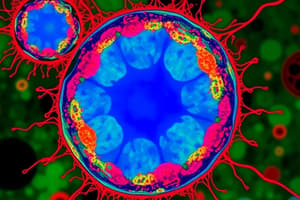Podcast
Questions and Answers
Son algunas características de la célula procariota que la diferencia de las células eucariotas
Son algunas características de la célula procariota que la diferencia de las células eucariotas
No tienen núcleo definido, no contienen organelos, esta célula es más pequeña la comparación de eucaiota y tiene su ADN esparcido por todo su citoplasmo
Es el organelo celular que ocupa de producir la energía que la célula requiere para su mejor funcionamiento
Es el organelo celular que ocupa de producir la energía que la célula requiere para su mejor funcionamiento
Mitocondria
Es uno de los organelos propios de las células vegetales
Es uno de los organelos propios de las células vegetales
Cloroplasto
Cuáles son los principios de la teoría celular
Cuáles son los principios de la teoría celular
Signup and view all the answers
Son cinco características que comparten las formas de vida desde la bacteria más simples hasta los animales más complejos
Son cinco características que comparten las formas de vida desde la bacteria más simples hasta los animales más complejos
Signup and view all the answers
Study Notes
Prokaryotic vs Eukaryotic Cells
- Prokaryotic cells differ from eukaryotic cells primarily in their structural organization, lacking a defined nucleus and membrane-bound organelles.
- They are generally smaller and simpler in complexity compared to eukaryotic cells.
Energy Production in Cells
- The organelle responsible for energy production is the mitochondrion, which generates adenosine triphosphate (ATP) through cellular respiration.
- Mitochondria are crucial for fulfilling the energy requirements essential for various cellular functions.
Plant Cell Organelles
- Chloroplasts are organelles distinct to plant cells, responsible for photosynthesis by converting sunlight into chemical energy.
- Chloroplasts contain chlorophyll, the pigment that captures light energy, facilitating the production of glucose.
Cell Theory Principles
- The cell theory encompasses five foundational principles:
- All living organisms are composed of one or more cells.
- The cell is the basic unit of life.
- Cells arise from pre-existing cells through cell division.
- Energy flow occurs within cells.
- Hereditary information is passed during cell division, ensuring continuity in genetic material across generations.
Studying That Suits You
Use AI to generate personalized quizzes and flashcards to suit your learning preferences.
Description
4


